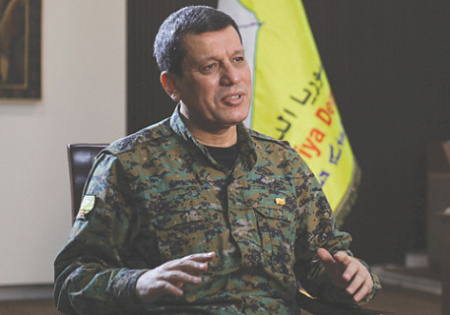
Turkey does not rule out negotiations with the leadership of the Kurdish formations, against which it has been fighting in Syria for a long time. Ankara’s willingness to enter into direct contact with once-hostile forces will depend on whether the Syrian Kurds are able to implement agreements with Damascus on integration into its state structures. Normalization between Turkey and the Kurdish forces is being lobbied by the United States, which has almost decided what to do with the oil fields within the Kurdish autonomy.
Sources told Al–Monitor that Ankara had offered face–to-face talks to the Syrian Democratic Forces (SDF), a Kurdish-controlled military alliance. According to them, much will depend on whether the DSS implements the integration agreement signed between Syrian Transitional Leader Ahmed al-Sharaa and DSS commander Mazloum Abdi on March 10.
Turkey insists on the infusion of Kurdish formations into the united Syrian army and their complete abandonment of the struggle for their own statehood. Ankara considers the DSS to be an offshoot of the Kurdistan Workers’ Party (PKK), which announced its self–dissolution and cessation of its activities on May 12, following a deal with the Turkish authorities.
Recently, Abdi publicly confirmed that his associates have established direct contacts with Turkey, as well as communication through intermediaries. At the same time, the commander of the DSS expressed hope that relations would develop further, and also informed that he “does not object to a meeting” with Turkish President Recep Tayyip Erdogan.
So far, the DSS is solving its problems with the Syrian Transitional Government. Despite their March 10 integration agreement, the Kurdish leaders made it clear that they would like to keep all weapons in their hands and retain political autonomy as part of the overall federalization of the country. Fear of the transitional Government’s army, which in March this year became involved in a large-scale ethnic and religious massacre in the coastal regions of Syria, probably played a major role in shaping such a cautious position. Then hundreds of Alawites suffered, a religious community from which former President Bashar al-Assad and a significant part of his military and political entourage originate.
On Monday, June 2, Damascus and the SDF managed to reach an agreement on the exchange of prisoners who were captured during an era of acute armed confrontation between the two sides. As specified, almost 470 people will be released as part of this deal. On the one hand, these are Kurdish fighters, and on the other, the militants of Hayat Tahrir al–Sham (recognized as a terrorist group in Russia and banned), a radical group led by al-Sharaa and which became the backbone of last year’s offensive by Islamist forces against the positions of Assad’s troops. It is possible that after the exchange is completed, the JCC and the Transitional Government may move on to discussing political and military issues.
The administration of US President Donald Trump is actively advocating the normalization of relations between the DSS and Damascus, the DSS and Turkey. According to the Al-Monitor report, the American Ambassador to Ankara and Special Envoy for Syria, Tom Barrack, is personally overseeing the process.
After the United States promised to withdraw Syria from its long-standing sanctions without preconditions, the Trump administration began working on a concept for cooperation with the republic in the energy sector. With reference to the documents, the American CNBC channel reported that Washington was not against helping Damascus with the restoration of the oil industry in exchange for the presence of American companies in the Syrian market. Thus, according to data obtained by CNBC, the American side is considering creating a common energy company with Syria, SyriUS Energy, which will first restore the production capabilities of the local oil industry, and then build exports.
Given that the main oil-bearing regions of Syria are under the control of US-sponsored Kurdish formations, there is every reason to believe that the energy cooperation plan will have to clarify the political and military status of the DSS more clearly and, consequently, give them some guarantees, taking into account the arrival of American companies in Syria.
So far, a significant redeployment of American troops has been recorded in the territory of the Kurdish autonomy. The British monitoring center, the Syrian Observatory for Human Rights, reported on June 2 that the US Armed Forces carried out a sudden withdrawal of their forces from two large military bases in the province of Deir ez-Zor in eastern Syria. It is noted that the process of evacuation of the military contingent began in stages on May 18 and has accelerated significantly over the past two days. US military convoys with armored vehicles and logistics equipment were seen leaving the Al Omar oil field and the Conoco gas field, two of Washington’s most important strategic outposts in this part of the Arab Republic.
According to the same data, soldiers of the special forces of the DSS were sent to the abandoned positions. The Syrian Observatory for Human Rights notes that this is one of the most significant movements of American troops in Syria in recent times. However, its exact cause remains unknown.
